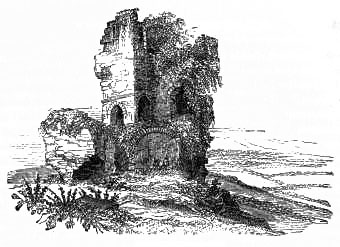Sir Henry Sidney

Kilcolman Castle
Spenser's Castle—Sidney's Official Account of Ireland—Miserable State of the Protestant Church—The Catholic Church and its Persecuted Rulers—The Viceroy's Administration—A Packed Parliament and its Enactments—Claim of Sir P. Carew—An Attempt to plant in Ulster—Smith's Settlement in the Ards—His Description of the Native Irish—He tries to induce Englishmen to join him—Smith is killed, and the attempt to plant fails—Essex next tries to colonize Ulster—He dies in Dublin—Sidney returns to Ireland—His Interview with Granuaile—Massacre at Mullamast—Spenser's Account of the State of Ireland.
[A.D. 1567—1579.]

ILCOLMAN CASTLE, with its fair domains, were bestowed on the poet Spenser, who had accompanied Lord Grey to Ireland in 1579. He has left a fearful description of the miseries of the country; but it scarcely exceeds the official report of Sir Henry Sidney, which must first be noticed. At the close of the month of January, 1567, the Lord Deputy set out on a visitation of Munster and Connaught. In his official account he writes thus of Munster: "Like as I never was in a more pleasant country in all my life, so never saw I a more waste and desolate land. Such horrible and lamentable spectacles are there to behold—as the burning of villages, the ruin of churches, the wasting of such as have been good towns and castles; yea, the view of the bones and skulls of the dead subjects, who, partly by murder, partly by famine, have died in the fields—as, in truth, hardly any Christian with dry eyes could behold." He declares that, in the territory subject to the Earl of Ormonde, he witnessed "a want of justice and judgment."
He describes the Earl of Desmond as "a man devoid of judgment to govern, and will be to be ruled." The Earl of Thomond, he says, "had neither wit of himself to govern, nor grace or capacity to learn of others." The Earl of Clanrickarde he describes as "so overruled by a putative wife, as ofttimes, when he best intendeth, she forceth him to do the worst;" and it would appear that neither he nor his lady could govern their own family, for their sons were so turbulent they kept the whole country in disturbance. In Galway he found the people trying to protect themselves, as best they might, from their dangerous neighbours; and at Athenry there were but four respectable householders, who presented him with the rusty keys of their town—"a pitiful and lamentable present;" and they requested him to keep those keys, for "they were so impoverished by the extortions of the lords about them, as they were no longer able to keep that town."
Well might he designate the policy by which the country had been hitherto governed as "cowardly," and contemn the practice of promoting division between the native princes, which was still practised. He adds: " So far hath that policy, or rather lack of policy, in keeping dissensions among them, prevailed, as now, albeit all that are alive would become honest and live in quiet, yet there are not left alive, in those two provinces, the twentieth person necessary to inhabit the same." Sidney at once proceeded to remedy the evils under which the unfortunate country groaned, by enacting other evils. We shall leave him to give his own account of his proceedings. He writes thus, in one of his official despatches: "I write not the names of each particular varlet that hath died since I arrived, as well by the ordinary course of the law, as of the martial law, as flat fighting with them, when they would take food without the good will of the giver, for I think it no stuff worthy the loading of my letters with; but I do assure you the number of them is great, and some of the best, and the rest tremble. For most part they fight for their dinner, and many of them lose their heads before they be served with supper. Down they go in every corner, and down they shall go, God willing."[3]
Notes
[3] Willing.—Sidney's Despatches, British Museum, MSS. Cat. Titus B. x.
